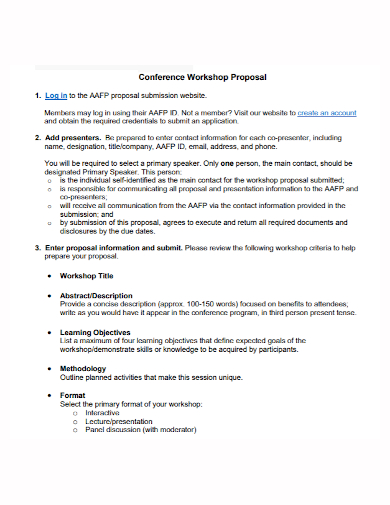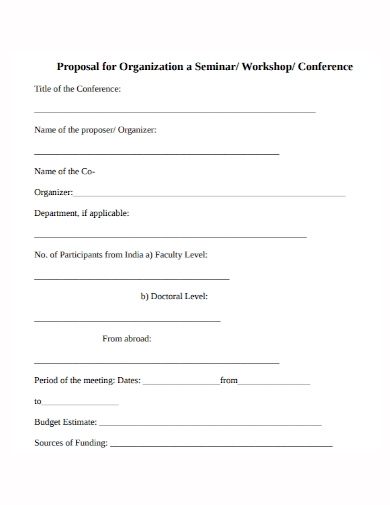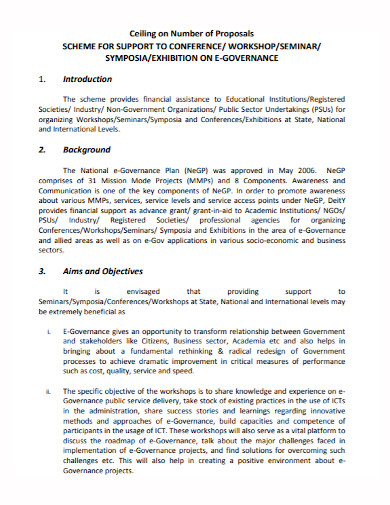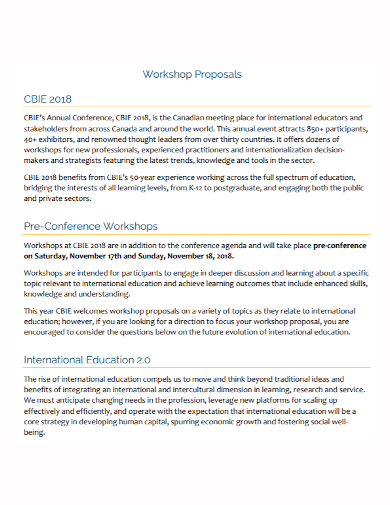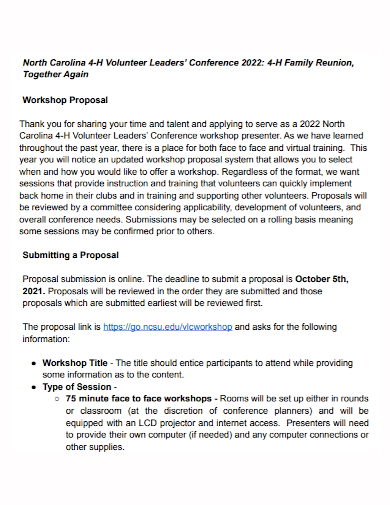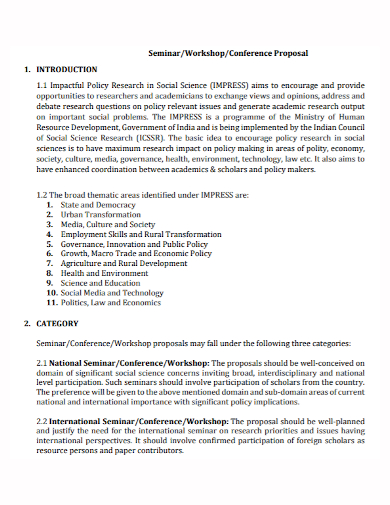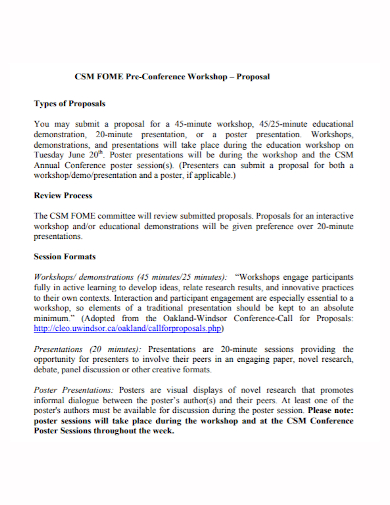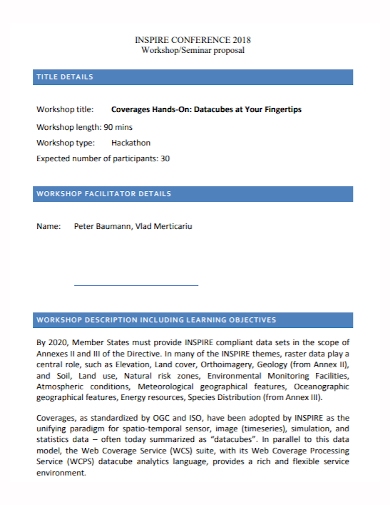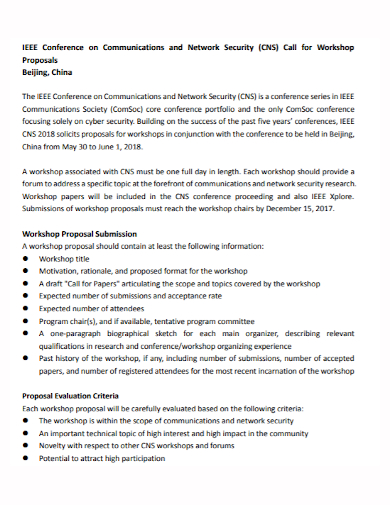A well-written workshop proposal is both concise and thorough. A typical proposal will include numerous crucial components. The workshop title, summary, syllabus, and objectives, as well as important biographical information, are all included. The first step in getting your proposal accepted is to make sure you meet all of the rules. The second step is to create a distinct and well-defined workshop. Obtain the institution’s or program’s official submission rules before submitting a workshop proposal. If you’re not familiar with the program, spend some time looking over its website to learn about other programs it offers, the qualifications of its current instructors, and its goal statement. Before submitting your proposal, be sure you and your course are a good fit for the program.
10+ Conference Workshop Proposal Samples
1. Conference Workshop Proposal Template
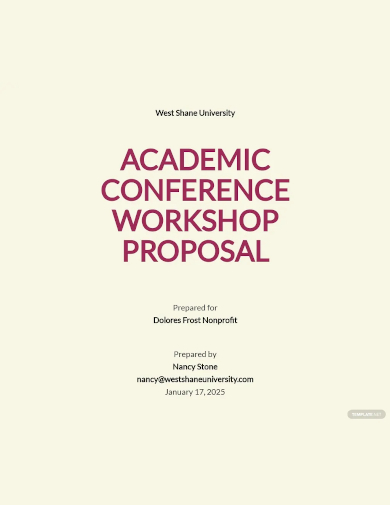
2. Conference Workshop Proposal
3. Organization Conference Workshop Proposal
4. Conference Support Workshop Proposal
5. Pre-Conference Workshop Proposal
6. Volunteer Conference Workshop Proposal
7. Health Conference Workshop Proposal
8. Seminar Workshop Conference Proposal
9. Conference Workshop Session Proposal
10. Sample Conference Workshop Proposal
11. Conference Communication Workshop Proposal
Make a workshop title that is both unique and specific. You want the potential audience to be able to tell what your course is about just by looking at the title. Potential students may overlook it in favor of a workshop that seems more intriguing if it is not visually appealing.
Creating a Workshop Proposal
- Title of the workshop – It’s critical to appropriately depict what you’re going to educate. Because the description serves as a marketing tool, it must be engaging. What can a student expect to gain from this course? What are the advantages of taking the course or workshop? What distinguishes this course or workshop from others that are similar? Keep your description to 150 words or less.
- Proposed time and date – These times and dates would fit within your calendar, but you might want to include a few alternatives if your initial choice doesn’t.
- Name and contact information – Because the proposal may be sent, emailed, or dropped off, it’s critical to include a way for the educational program manager to contact you after they’ve reviewed it.
- Supplies required – Include a list of the materials you’ll need, such as a whiteboard and markers, a flip chart(s) and markers, name tags, name cards, binders/folders, copies of handouts, books ordered, and so on.
- AV requirements – Include this portion of the workshop proposal if you require a computer, projector, screen, speakers, microphone(s), or other audio-visual equipment.
- Room set-up requirements – Provide instructions in this section if you need the training room set up for specific activities. Request tables if the audience will require a writing surface. Allow ample space for the audience to move around and interact if you anticipate them to do so (best practice).
- Marketing ideas – Offer your suggestions for how to promote the workshop or course to the potential audience, as the workshop or course will need to be advertised. Do you know of any industry publications, blogs, websites, or newsletters that might publish a mention about your future course? In this part, make a list of potential marketing avenues. Include the promotion you’ll be doing, such as using social media to promote it (Facebook, Twitter, Pinterest, etc.).
- Resume – A resume is optional if your bio is a good description of your background. It is a good idea to add your resume with the proposal if it lends more credibility to your industry experience.
FAQs
Is there a need to prepare a workshop summary?
Yes. In a short paragraph, clearly explain the topic of your workshop and its relevance to the program and students. Brevity is key in proposals because reviewers do not have time to read pages and pages of reasons why your workshop would be fantastic. Your summary serves as an introduction to both you and your workshop at the same time. Make each sentence count by concentrating on the course’s main goal.
Why are having sponsors important?
Sponsors can help support your seminar or webinar, allowing you to accomplish more than you could if you had to cover all of the costs alone. Determine the many types of sponsorship activations you can provide. To find out who to contact, look for sponsors who have associated with comparable conferences and are aiming to reach the same target demographic. Make a list of your top choices and start a cold email campaign with them. Our workbook will assist you in determining the market rate for your sponsorship packages as you prepare your pitch.
It can be really fulfilling to share your knowledge with a group of enthusiastic listeners. Educational program administrators and conference planners are frequently on the lookout for fresh and exciting courses and workshops to add to their schedules. Submitting a workshop or course proposal and offering your expertise to anyone can be a win-win situation.
Related Posts
Title Project Proposal Samples [ Community, School, Student ]
FREE 10+ Health Project Proposal Samples [ Public, Mental, Healthcare ]
FREE 11+ Engineering Project Proposal Samples in PDF | MS Word
FREE 4+ Racing Sponsorship Proposal Samples [ Team, Car, Driver ]
FREE 10+ Nursing Project Proposal Samples [ Community, Health, Clinical ]
FREE 11+ Student Council Proposal Samples in PDF | DOC
FREE 8+ Joint Venture Proposal Samples [ Commercial, Real Estate, Construction ]
FREE 10+ Scholarship Proposal Samples [ Project, Grant, Sponsorship ]
FREE 10+ Network Project Proposal Samples [ Design, Security, Bank ]
FREE 14+ Accounting Proposal Samples in PDF | MS Word
FREE 10+ Church Event Proposal Samples in MS Word | Google Docs | Apple Pages | PDF
FREE 10+ History Proposal Samples [ Dissertation, Thesis, Paper ]
FREE 34+ Sponsorship Proposal Samples in PDF | MS Word | Pages | Google Docs
FREE 11+ Cost Proposal Samples & Templates in PDF
FREE 11+ Maintenance Proposal Samples in MS Word | Google Docs | PDF

